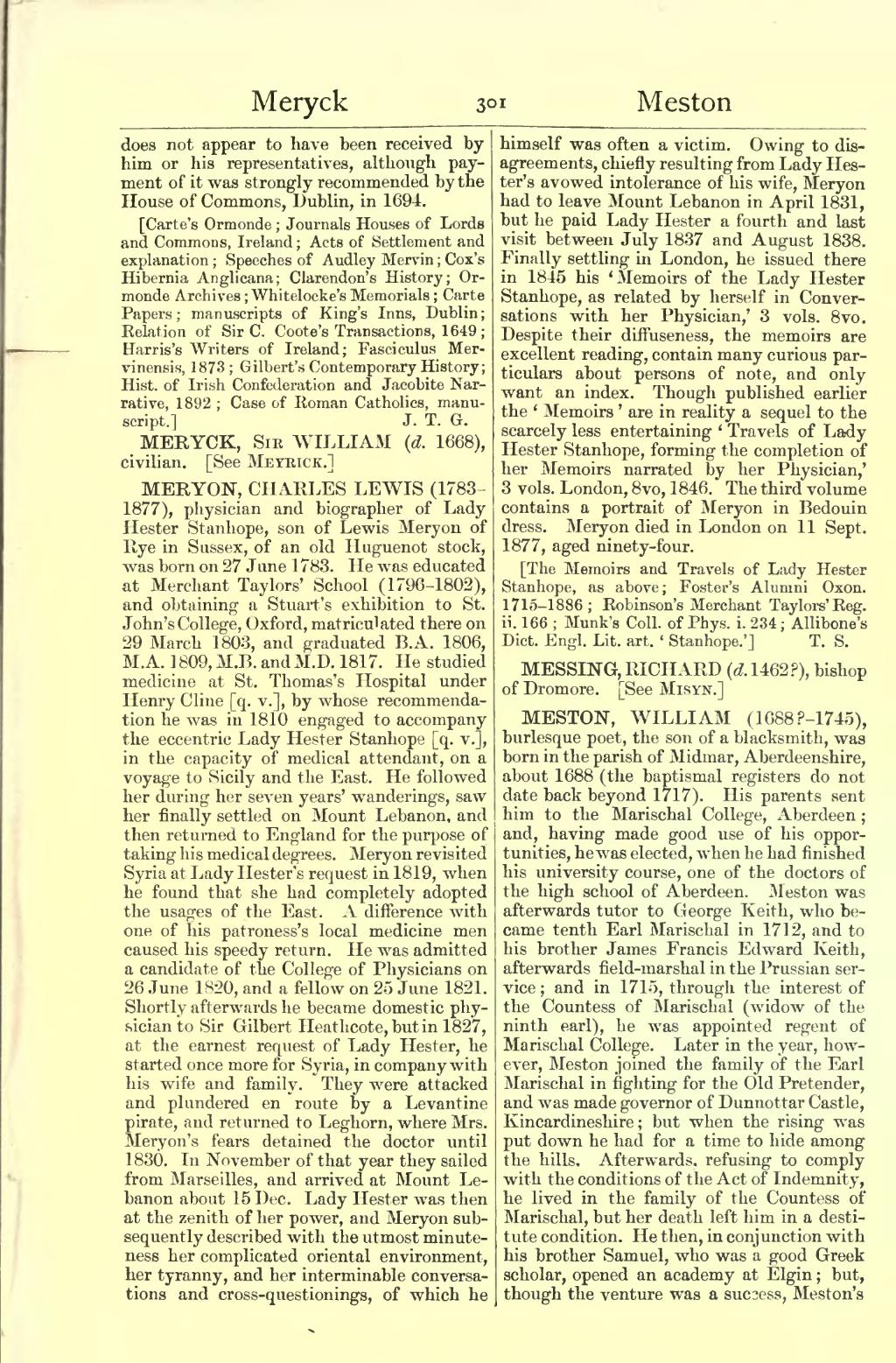does not appear to have been received by him or his representatives, although payment of it was strongly recommended by the House of Commons, Dublin, in 1694.
[Carte's Ormonde; Journals Houses of Lords and Commons, Ireland; Acts of Settlement and explanation; Speeches of Audley Mervin; Cox's Hibernia Anglicana; Clarendon's History; Ormonde Archives; Whitelocke's Memorials; Carte Papers; manuscripts of King's Inns, Dublin; Relation of Sir C. Coote's Transactions, 1649; Harris's Writers of Ireland; Fasciculus Mervinensis, 1873; Gilbert's Contemporary History; Hist. of Irish Confederation and Jacobite Narrative, 1892; Case of Eoman Catholics, manuscript.]
MERYCK, SIR WILLIAM (d. 1668), civilian. [See Meyrick.]
MERYON, CHARLES LEWIS (1783–1877), physician and biographer of Lady Hester Stanhope, son of Lewis Meryon of Rye in Sussex, of an old Huguenot stock, was born on 27 June 1783. He was educated at Merchant Taylors' School (1796–1802), and obtaining a Stuart's exhibition to St. John's College, Oxford, matriculated there on 29 March 1803, and graduated B.A. 1806, M.A. 1 809, M.B. and M.D. 1817. He studied medicine at St. Thomas's Hospital under Henry Cline [q. v.], by whose recommendation he was in 1810 engaged to accompany the eccentric Lady Hester Stanhope [q. v.], in the capacity of medical attendant, on a voyage to Sicily and the East. He followed her during her seven years' wanderings, saw her finally settled on Mount Lebanon, and then returned to England for the purpose of taking his medical degrees. Meryon revisited Syria at Lady Hester's request in 1819, when he found that she had completely adopted the usages of the East. A difference with one of his patroness's local medicine men caused his speedy return. He was admitted a candidate of the College of Physicians on 26 June 1820, and a fellow on 25 June 1821. Shortly afterwards he became domestic physician to Sir Gilbert Heathcote, but in 1827, at the earnest request of Lady Hester, he started once more for Syria, in company with his wife and family. They were attacked and plundered en route by a Levantine pirate, and returned to Leghorn, where Mrs. Meryon's fears detained the doctor until 1830. In November of that year they sailed from Marseilles, and arrived at Mount Lebanon about 15 Dec. Lady Hester was then at the zenith of her power, and Meryon subsequently described with the utmost minuteness her complicated oriental environment, her tyranny, and her interminable conversations and cross-questionings, of which he himself was often a victim. Owing to disagreements, chiefly resulting from Lady Hester's avowed intolerance of his wife, Meryon had to leave Mount Lebanon in April 1831, but he paid Lady Hester a fourth and last visit between July 1837 and August 1838. Finally settling in London, he issued there in 1845 his 'Memoirs of the Lady Hester Stanhope, as related by herself in Conversations with her Physician,' 3 vols. 8vo. Despite their diffuseness, the memoirs are excellent reading, contain many curious particulars about persons of note, and only want an index. Though published earlier the 'Memoirs' are in reality a sequel to the scarcely less entertaining 'Travels of Lady Hester Stanhope, forming the completion of her Memoirs narrated by her Physician,' 3 vols. London, 8vo, 1846. The third volume contains a portrait of Meryon in Bedouin dress. Meryon died in London on 11 Sept. 1877, aged ninety-four.
[The Memoirs and Travels of Lady Hester Stanhope, as above; Foster's Alumni Oxon. 1715-1886; Robinson's Merchant Taylors' Reg. ii. 166; Munk's Coll. of Phys. i. 234; Allibone's Dict. Engl. Lit. art. 'Stanhope.']
MESSING, RICHARD (d. 1462?), bishop of Dromore. [See Misyn.]
MESTON, WILLIAM (1688?–1745), burlesque poet, the son of a blacksmith, was born in the parish of Midmar, Aberdeenshire, about 1688 (the baptismal registers do not date back beyond 1717). His parents sent him to the Marischal College, Aberdeen; and, having made good use of his opportunities, he was elected, when he had finished his university course, one of the doctors of the high school of Aberdeen. Meston was afterwards tutor to George Keith, who became tenth Earl Marischal in 1712, and to his brother James Francis Edward Keith, afterwards field-marshal in the Prussian service; and in 1715, through the interest of the Countess of Marischal (widow of the ninth earl), he was appointed regent of Marischal College. Later in the year, however, Meston joined the family of the Earl Marischal in fighting for the Old Pretender, and was made governor of Dunnottar Castle, Kincardineshire; but when the rising was put down he had for a time to hide among the hills. Afterwards, refusing to comply with the conditions of the Act of Indemnity, he lived in the family of the Countess of Marischal, but her death left him in a destitute condition. He then, in conjunction with his brother Samuel, who was a good Greek scholar, opened an academy at Elgin; but, though the venture was a success, Meston's
